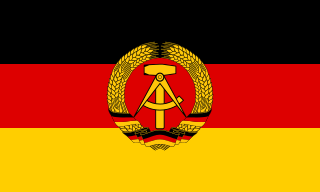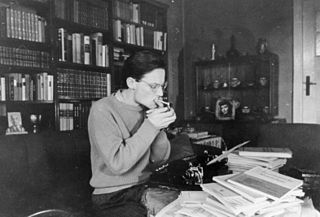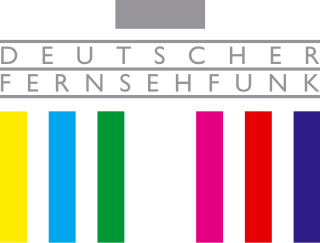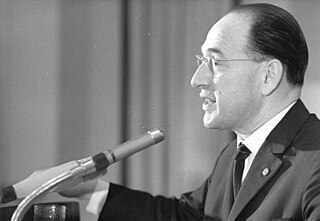Related Research Articles

East Germany, officially the German Democratic Republic, was a state that existed from 1949 to 1990 in eastern Germany as part of the Eastern Bloc in the Cold War. Commonly described as a communist state, it described itself as a socialist "workers' and peasants' state". Its territory was administered and occupied by Soviet forces following the end of World War II—the Soviet occupation zone of the Potsdam Agreement, bounded on the east by the Oder-Neisse line. The Soviet zone surrounded West Berlin but did not include it and West Berlin remained outside the jurisdiction of the GDR. Most scholars and academics describe the GDR as a totalitarian dictatorship.

The Socialist Unity Party of Germany, often known in English as the East German Communist Party, was the founding and ruling party of the German Democratic Republic from the country's foundation in October 1949 until its dissolution after the Peaceful Revolution in 1989. It was a Marxist–Leninist communist party, established in April 1946 as a merger between the East German branches of the Communist Party of Germany and Social Democratic Party of Germany.

Socialist realism is a style of idealized realistic art that was developed in the Soviet Union and was the official style in that country between 1932 and 1988, as well as in other socialist countries after World War II. Socialist realism is characterized by the depiction of communist values, such as the emancipation of the proletariat. Despite its name, the figures in the style are very often highly idealized, especially in sculpture, where it often leans heavily on the conventions of classical sculpture. Although related, it should not be confused with social realism, a type of art that realistically depicts subjects of social concern, or other forms of "realism" in the visual arts. Socialist realism was made with an extremely literal and obvious meaning, usually showing an idealized USSR. Socialist realism was usually devoid of complex artistic meaning or interpretation.

The Free German Youth is a youth movement in Germany. Formerly, it was the official youth movement of the German Democratic Republic (GDR) and the Socialist Unity Party of Germany.

Wolfgang Harich was a philosopher and journalist in East Germany.

Johannes Robert Becher was a German politician, novelist, and poet. He was affiliated with the Communist Party of Germany (KPD) before World War II. At one time, he was part of the literary avant-garde, writing in an expressionist style.

The National-Social Association was a political party in the German Empire, founded in 1896 by Friedrich Naumann. It sought to synthesise liberalism, nationalism and non-Marxist socialism with Protestant Christian values in order to cross the ideological front lines and draw workers away from Marxist class struggle. However, it never grew beyond a minor party of intellectuals which failed to gain mass support in elections.
The Communist Party of Germany is an anti-revisionist Marxist-Leninist communist party in Germany. It is one of several parties which claim the KPD name and/or legacy. It was founded in Berlin in 1990.
As with many Soviet-allied countries prior to the fall of the Berlin Wall, the government of the former German Democratic Republic applied censorship during its existence from 1949 to 1990. The censorship was practised through a hierarchical but unofficial censorship apparatus, ultimately controlled by the ruling party (SED). Through censorship, the socialist point of view on society was ensured in all forms of literature, arts, culture and public communication. Due to the lack of an official censorship apparatus, censorship was applied locally in a highly structured and institutionalized manner under the control of the SED.
Neues Deutschland is a left-wing German daily newspaper, headquartered in Berlin.

Volker Braun is a German writer. His works include Provokation für mich – a collection of poems written between 1959 and 1964 and published in 1965, a play, Die Kipper, and Das ungezwungene Leben Kasts (1972).
East German literature is the literature produced in East Germany from the time of the Soviet occupation in 1945 until the end of the communist government in 1990. The literature of this period was heavily influenced by the concepts of socialist realism and controlled by the communist government. As a result, the literature of the German Democratic Republic was for decades dismissed as nothing more than "Boy meet Tractor literature", but its study is now considered a legitimate field. Because of its language, the literature is more accessible to western scholars and is considered to be one of the most reliable, if not the most reliable, sources about East Germany.

Deutscher Fernsehfunk was the state television broadcaster in the German Democratic Republic from 1952 to 1991.
The Conciliator faction was an opposition group within the Communist Party of Germany during the Weimar Republic and the Third Reich. In East Germany, after World War II, the German word for conciliator, Versöhnler, became a term for anti-Marxist political tendencies.
Socialist patriotism is a form of patriotism promoted by Marxist–Leninist movements. Socialist patriotism promotes people living within Marxist–Leninist countries to adopt a "boundless love for the socialist homeland, a commitment to the revolutionary transformation of society [and] the cause of communism". Marxist–Leninists claim that socialist patriotism is not connected with nationalism, as Marxists and Marxist–Leninists denounce nationalism as a bourgeois ideology developed under capitalism that sets workers against each other. Socialist patriotism is commonly advocated directly alongside proletarian internationalism, with communist parties regarding the two concepts as compatible with each other. The concept has been attributed by Soviet writers to Karl Marx and Vladimir Lenin.

Klaus Gysi was a journalist and publisher and a member of the French Resistance against the Nazis. After World War II, he became a politician in the German Democratic Republic, serving in the government as Minister of Culture from 1966 to 1973, and from 1979 to 1988, as the State Secretary for Church Affairs. He was a member of the Socialist Unity Party (SED) and after German Reunification, the Party of Democratic Socialism (PDS). His son is the German politician Gregor Gysi.
Hermann Weber was a German historian and political scientist. He has been described as "the man who knew everything about the German Democratic Republic".
Marlies Deneke is a German politician.
Edgar Hartwig is an East German historian. In the GDR he taught scientific socialism at the Hochschule für Musik Franz Liszt, Weimar until 1989 and, within the framework of the "Arbeitsgruppe zur Geschichte der bürgerlichen Parteien" at the Friedrich-Schiller-Universität Jena, he presented the history of the Pan-German League and the German Agrarian League.

The Ten Commandments of Socialist Morality and Ethics, also known as Ten Commandments for the New Socialist Man, were proclaimed by Walter Ulbricht, then First Secretary of the Socialist Unity Party of Germany (SED), at the fifth SED Party Congress. Formally based on the biblical Ten Commandments, they summarized the political duties of every citizen of the German Democratic Republic (GDR), were incorporated into the SED's party program by the sixth SED party congress in 1963, and remained in it until 1976.
References
- 1 2 Emmerich, W., 1996. Kleine Literaturgeschichte der DDR. Leipzig: Aufbau Verlag.
- ↑ Weigert, A., 1999. Das öffentliche Bibliothekswesen der DDR im Landkreis.. In: P. Vodosek & K. Marwinski, eds. Geschichte des Bibliothekswesens in der DDR (Wolfenbütteler Schriften zur Geschichte des Buchwesens Band 31). Wiesbaden: Harrassowitz Verlag, p. 87 f.
- 1 2 Magee, D. M. D., 2014. Michigan State University. [Online] Available at: https://www.msu.edu/~mageemal/iah201/stalinism.html [Accessed 30 12 2014].
- 1 2 3 4 5 Rüther, D. G., 2001. Stalinismus und Sozialistischer Realismus. Bonn: Rheinische Friedrich-Wilhelms-Universität.
- ↑ Grau, A., 1998. Stiftung Haus der Geschichte der Bundesrepublik Deutschland. [Online] Available at: http://hdg.de/lemo/html/Nachkriegsjahre/EntstehungZweierDeutscherStaaten/gruendungDerDDR.html [Accessed 30 12 2014].
- 1 2 3 Kuegelgen, D. v., 2010. Der Schriftstellerverband in der DDR. Berlin, Germany: ver.di.
- ↑ Lentz, M., 2010. Vorwort. Neue Rundschau. Prosa Leipzig, Issue 1, p. 9.
- 1 2 Stöhr, M., 2006. Literaturpropaganda als Bibliothekskultur. Ideologie und Wirklichkeit im Öffentlichen Bibliothekswesen der frühen DDR. Libreas. Library Ideas, Issue 5.
- 1 2 Kleßmann, C., 2002. Bundeszentrale für Politische Bildung. [Online] Available at: http://www.bpb.de/izpb/10128/aufbau-eines-sozialistischen-staates?p=all [Accessed 10 01 2015].
- ↑ Neumayer, I., 2008. Das Mediensystem in der DDR. [Online] Available at: "Das Mediensystem der DDR | Hintergrund | Inhalt | Kalter Krieg Äther | Wissenspool". Archived from the original on 2014-11-12. Retrieved 2016-04-15. [Accessed 10 01 2015].
- ↑ Wilke, J., 2007. Journalisten und Journalismus in der DDR.. Cologne, Germany: Böhlau Verlag.
- ↑ Heckmann-Janz, K., 2009. "Deutschlandradio Kultur. Greif zur Feder, Kumpel!". [Online] Available at: http://www.deutschlandradiokultur.de/greif-zur-feder-kumpel.984.de.html?dram:article_id=153464 [Accessed 10 01 2015].
- ↑ Jung, D. T., 2001. Universität Potsdam - Germanistik. [Online] Available at: http://www.uni-potsdam.de/u/germanistik/individual/jung/lehre-buchenwald-ddr.htm Archived 2007-07-19 at the Wayback Machine [Accessed 10 01 2015].
- ↑ Strittmatter, E., 1959. An die Basis – gegen die Selbstzufriedenheit. Neues Deutschland, 28 04.
- ↑ Mitteldeutscher Runfunk, 2011. Damals im Osten. [Online] Available at: http://www.mdr.de/damals/archiv/artikel75310_dosArt-artikel75316_zc-d5d8ccc7.html#anchor5 [Accessed 09 01 2015].